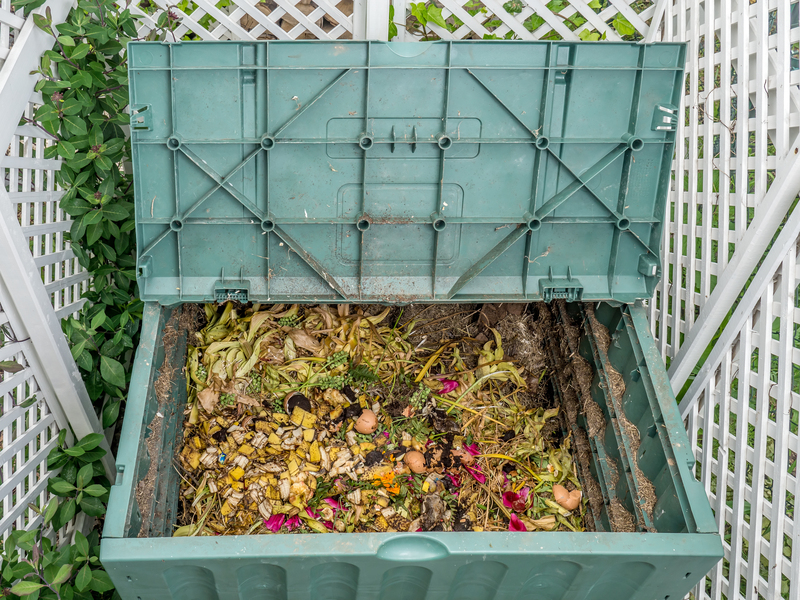Eco-Friendly Waste Solutions: Rubbish Removal Bags vs Skips
As environmental concerns become an ever-growing focal point in our society, the demand for sustainable waste management practices has surged. Choosing the right waste disposal method is crucial for both households and businesses. Among the leading options are rubbish removal bags and skips. In this guide, we delve into their eco-friendliness, efficiency, costs, and environmental impact, helping you make the best decision for your waste needs.
Understanding Waste Management Trends
Modern waste solutions are evolving to address our planet's environmental health. Traditional landfill methods are gradually being replaced by eco-friendly alternatives that focus on recycling, reducing emissions, and minimising landfill usage. Today, two popular choices for disposing of general renovation or house-clearance waste are rubbish removal bags and skips.
The Rise of Eco-Conscious Waste Disposal
- Government policies encourage sustainable practices and responsible disposal.
- Consumers prefer greener, more sustainable services.
- Companies innovate by offering environmental benefits in their waste removal solutions.
Choosing between a skip hire and removal bags isn't just about convenience--it's about making a decision with minimal environmental footprint.

What Are Rubbish Removal Bags?
Rubbish removal bags, often referred to as "skip bags" or "junk sacks," are large, durable, woven polypropylene bags designed to hold waste for collection. They are delivered flat-packed, expanded as needed, and collected once filled.
- Versatile and available in multiple sizes, from small home-cleaning bags to large builders' junk bags.
- Lightweight and easy to store till use.
- Normally used for domestic clear-outs, DIY waste, garden debris, and small construction projects.
Environmental Advantages of Rubbish Removal Bags
- Minimal Production Resources: Their production uses less material and energy compared to skips.
- Reusable: Some heavy-duty bags can be reused multiple times before disposal. Certain suppliers offer return programs for bag reuse or recycling.
- Reduced Transportation Emissions: Bags are delivered flat, requiring less space and fewer trips for delivery compared to bulky skips.
- Encourages Segregation: Due to limited bag size, users often pre-sort rubbish, aiding recycling efforts.
What Is Skip Hire?
Skips are large, rigid open-topped containers made from metal, designed for holding and transporting waste. Used extensively in construction, renovations, and large clearances, skips are delivered with a lorry and placed on-site for direct filling, later collected for waste processing.
- Available in a variety of sizes (mini skips to industrial containers).
- Accommodates bulky, heavy, and diverse waste streams.
- Essential for major renovations, demolitions, and large-scale commercial disposal needs.
Environmental Considerations with Skips
- Durability & Longevity: Skips are designed for decades of reuse, greatly reducing one-use waste.
- Bulk Waste Consolidation: Efficient for handling large volumes of recyclable material.
- Heavy Logistics Footprint: Transporting and relocating skips involves heavy vehicles--more fuel, emissions, and road impact.
- Non-Segregated Waste: Skips are often filled haphazardly, which can contaminate recyclables and increase landfill rates if sorting isn't enforced.
Comparing Eco-Friendly Waste Disposal: Rubbish Removal Bags vs Skips
Let's break down the main comparison points between rubbish removal bags and skips, focusing on their environmental credentials and suitability for different waste disposal scenarios.
1. Resource Efficiency
- Rubbish bags: Require fewer resources to produce, transport, store, and dispose. The production of polypropylene (the main material) has a lower carbon cost than steel for skips.
- Skips: Initial production is resource-intensive, but their long lifespan means this environmental burden is distributed over hundreds of uses.
2. Transportation Impact
- Rubbish removal bags: Delivered flat-packed, saving space and making round-trip logistics highly efficient.
- Skips: Require a lorry per trip for both delivery and collection, equating to higher emissions, fuel use, and road wear.
3. Recycling & Sorting Efficiency
- Rubbish bags: Naturally encourage users to fill them with one waste type, such as garden rubbish or general debris, making it easier for companies to recycle and process.
- Skips: Facilitate the disposal of mixed waste but can lead to contamination if users dispose of various materials together, hampering recycling.
4. Lifecycle and Reusability
- Rubbish removal bags: Most are single-use but can sometimes be reused a few times. A wise choice is to select suppliers who retrieve, clean, and reissue their bags.
- Skips: Designed for long-term, repetitive use, sometimes lasting decades, thereby spreading out their environmental manufacturing impact.
5. Space, Accessibility, and Community Impact
- Rubbish bags: Can be filled and left in accessible spots like driveways or front gardens, taking up little space.
- Skips: Occupy significant space, often block driveways or streets, and may require local authority permits--especially in urban areas.
6. Cost Considerations and Value for Money
- Rubbish removal bags: Lower upfront cost for small jobs. You only pay for collection when you're ready, and there's no hire period limit.
- Skips: Pricey for short uses or small loads but highly efficient and cost-effective for substantial volumes of waste.
When to Choose Rubbish Removal Bags
If your goal is easy, budget-friendly, and low-impact waste disposal, rubbish removal bags tick all the right boxes:
- Perfect for small clear-outs: Great for decluttering, garden waste, and minor renovation leftovers.
- Limited property access: Suitable where skip lorries can't reach, such as narrow streets and terraced homes.
- Space-saving: Store bags flat until needed, no trip hazards or driveway blockages.
- Delayed collection: Fill at your own pace--just book the pickup when you're finished.
- Lower environmental impact: Minimal resource usage, reduced transport emissions, and improved recycling potential.
Tips for Sustainable Use of Rubbish Removal Bags
- Choose biodegradable or recycled bags where available.
- Avoid overfilling--stick to the recommended weight to ensure safe vehicle collection and handling.
- Pre-sort your waste into garden, electrical, or recyclable for efficient processing.
- Support companies with a sustainable ethos--find suppliers who guarantee high recycling rates.
When to Opt for Skips
Skips remain unbeatable for large-scale waste management-especially during extensive construction, shop clearances, or major landscaping projects.
- Heavy waste: Concrete, bricks, and soil are better suited to sturdy metal skips.
- Volume: Massive waste volumes justify the emissions and costs associated with skips.
- Long-term on-site needs: Skips can stay for multiple days or weeks--ideal for ongoing projects.
- Strict site requirements: Certain sites demand skips for safety and compliance purposes.
Tip: Maximise skip sustainability by:
- Filling in an organised manner--keep recyclables, metals, and general waste separate.
- Partnering with skip companies committed to eco-friendly waste management and traceability.
- Choosing 'man and van' services or segregated skips for different waste streams.
Which Is More Eco-Friendly: Rubbish Removal Bags or Skips?
It comes down to the type, amount, and frequency of your waste.
- For small, sorted, domestic waste, rubbish removal bags often boast a lower carbon footprint. They encourage recycling, reduce logistics emissions, and rarely obstruct public spaces.
- For large, heavy, or multi-day jobs, skips can be justified by their long usable lifespan and capacity to divert bulk material from landfill, as long as you or your contractor sorts the waste responsibly.
In both cases, the true eco-friendliness comes down to what happens after collection: choosing waste management partners who recycle, repurpose and strive for zero landfill is essential.
Boosting Eco-Friendly Credentials: What to Ask Your Waste Removal Company
Before booking your skip hire or rubbish removal bag collection, ask these important questions:
- What percentage of collected waste is recycled? (Look for companies with >90% waste recovery rates.)
- Are your bags/skips reused or recycled after use?
- Do you offer separate collection or sorting options? (Especially for items like electronics, metals, and hazardous waste.)
- What environmental accreditations do you hold?
Responsible Waste Disposal: Dos and Don'ts
- Do: Pre-sort wherever possible--separate garden, glass, wood, and general waste.
- Do: Always comply with local waste rules and avoid fly-tipping.
- Don't: Overload your bag or skip--it's unsafe and could void collection.
- Don't: Mix hazardous items like paint, batteries, or electricals--they usually require separate collection by law.
Summary: Choosing the Best Eco-Conscious Waste Solution
In summary, both rubbish removal bags and skips offer viable, responsible waste disposal options with benefits for home and commercial use. The most eco-friendly solution will depend on your unique needs:
- For small-scale, well-sorted, or intermittent waste: Choose rubbish removal bags for maximum convenience and a lighter ecological footprint.
- For large-scale, heavy, or ongoing waste: Hire a skip, but engage with a company that can guarantee a high recycling rate and responsible waste management.
- For ongoing green improvements: Pre-sort your waste, use suppliers who offer recycling traceability, and reduce, reuse and recycle wherever possible.
By prioritising sustainable practices and making informed choices between rubbish removal bags and skips, you contribute to a cleaner, healthier environment for your community and the planet.

Frequently Asked Questions
Are skip bags recyclable?
Yes, many skip bags are made from recyclable polypropylene and may be reused or recycled by responsible companies--check with your waste collector for specific details.
Is skip hire more expensive than rubbish removal bags?
It varies by location, duration, and volume, but for smaller jobs, rubbish removal bags are usually more affordable, while skips offer better value for bigger waste quantities.
How do I know my waste is being recycled?
Request a waste transfer note or recycling certificate from your supplier. Reputable companies track their recycling rates and provide transparency about your waste's final destination.
Can I put everything in a rubbish removal bag?
No. Hazardous waste, large electrical appliances, liquids, asbestos, and similar items are prohibited--consult your supplier for a full list of unacceptable materials.
Will choosing eco-friendly waste solutions make a difference?
Absolutely--every responsible disposal reduces landfill pressure, cuts emissions, and supports the move towards a circular economy.
Final Thoughts: Your Role in Sustainable Waste Management
Eco-friendly waste solutions like rubbish removal bags and skips help reduce landfill, pollution, and carbon emissions when used thoughtfully. Your choices matter: always look for recycling guarantees, pre-sort your waste, and select the right solution for your needs. With small changes and informed decisions, together we can achieve a more sustainable future.
Ready to clear out sustainably? Compare your local providers, focus on eco-credentials, and make rubbish removal part of building a greener world.
```